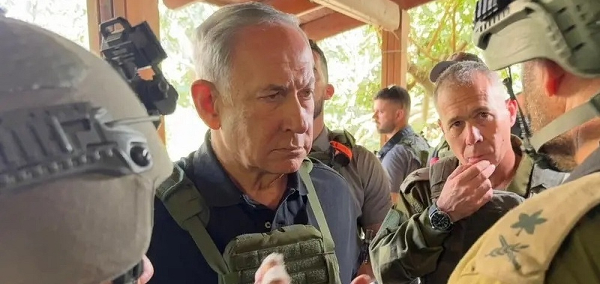image1
Despite inflicting heavy casualties and costs on the Israeli regime, the new confrontation between the Palestinian resistance and Tel Aviv that started on 7 October has brought about a breathing space for the hardline cabinet of Benjamin Netanyahu that has been facing massive protests since it began work nearly a year ago.
Never thinking that his policy of controlled clashes with Gaza to distract the Israelis from the home crises would led to the start of Hamasís Operation Al-Aqsa Storm and driving him to the brink of collapse, Netanyahu believes the only chance for survival is launching a ground offensive into Gaza. However, unknown challenges of this decision for Bibi are not less than the devastating impacts of Operation Al-Aqsa Storm. Still, the Israeli PM is considering biggest gamble of his political life to get escape the quagmire he is in.
Claiming that Gaza war for the Israelis is a matter of life and death, Netanyahu tries to insinuate to the settlers that he is fighting the Palestinian groups for their security, something he hopes saves him from the nightmare of ‘protest Saturdaysí that over the past months have grabbed calm from the government hardliners.
It is almost certain to all that even after claims of forming an emergency cabinet to put aside the differences, the Israelis are not able to bridge their gaps. There is even no consensus about the way Tel Aviv should deal with the current crisis. Therefore, Netanyahu, who is preparing to deal with the current major crisis with a shaky consensus and sees the shadow of peril still hanging over his head, does not want to miss the last remaining chance.
Buying time
Netanyahu understands the conditions in the occupied territories very well and knows that if the clashes with Hamas in Gaza stop, the opponents and election rivals will use the unprecedented losses of the Israeli forces as a pretext to bring down his radical cabinet. Therefore, he wants to continue tensions with the Palestinian resistance groups, announcing that Israeli army is preparing for a long-term battle.
In the present conditions, for the PM and his orbit, the best choice is to make occupied territories security-obsessed and the currency of this scenario is waging a new war against Palestinians and massacring the Gazans, and up to now, he seems to have made a relative success.
Netanyahu sees aggression on Gaza as a temporary lifeline for his government to reinforce his cabinet and delay his trial on corruption charges. Because given the current political atmosphere, everything for Netanyahu and other hardliners is over, and therefore by prolonging the conflict with Hamas in Gaza, they are trying to buy some time to save themselves from trial.
Netanyahu and his cabal who in recent months brought the tensions with the resistance groups in the West Bank and Gaza to new heights are trying to make the most of the opportunity they have to fulfill their ultimate aim of uprooting the resistance factions. To this end, the Israeli military plans to launch a ground offensive in next days to, as they claim, "demolish" Hamas and Islamic Jihad.
Netanyahu claims that by occupying Gaza and winning the battle with the resistance groups, he will change regionís status quo, but the conditions of recent months, especially the Arab-Iranian reconciliation in the region and the stagnation the normalization of relations, showed that the Israelis more than ever are isolated and stepping up their crimes in Gaza, which have even drawn outrage of the Western public, will add to their isolation.
Ground offensive on Gaza, the slaughterhouse of Israeli forces
Though the right-wing Israeli government says that it can fully occupy Gaza with calling up its 300,000 reservists, West media and experts warn that this action can cost the occupiers dearly. First of all, Netanyahu wants to seize Gaza with reserve forces that defied the government orders a few months ago in protest to the judicial reforms. Despite the governmentís push to create a sentimental and nationalist atmosphere in the society and among the military forces for maximum mobilization, insubordination is still reported among the reservists as they are called up for deployment to the expected ground battle, and given the possibility of materialization of threats on the northern front by Hezbollah, it is impossible to mobilize all the ground forces for Gaza offensive.
Secondly, the Israeli army has shown to be highly vulnerable in asymmetric and guerrilla warfare, and even if it had any achievements in the past seven decades, it has been thanks to its air power, which has kept the balance in its favor on the ground.
In other words, Netanyahu plans to bring reserve forces and army personnel into Gaza who are experiencing urban warfare for the first time. Experts suggest that Hamas and Islamic Jihad have the upper hand in face-to-face combat, and using the tunnels under Gaza and knowing the area well, they can deal fatal blows to their Israeli enemy. The resistance leaders warned that if the Israeli army enters Gaza, it will lose half of its forces.
This means that Netanyahu setting his hopes on success of the rebellious reserve forces in Gaza ground offensive not only will not meet the expectations of the hardliners, but also will double the costs and casualties of the Israeli occupation and at the same time provide a good opportunity for the opposition to topple the government and regain power. The opposition groups in the past few days blamed the casualties from Hamas operation on uncalculated government actions and called for Netanyahu to step down.
By massacring Gaza people and prolonging the war, the Israeli PM is looking for a escape path to save his collapsing government. But the course of developments shows that this time Gaza swamp will bring his political life to an end.











